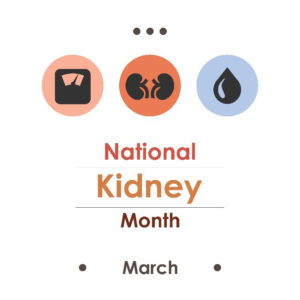Did you know, March is designated as National Kidney Month and Thursday, March 10th is World Kidney Day? Here at Dorsey Schools, we wanted to take a moment to help bring added awareness to not only National Kidney Month and World Kidney Day, but the importance of overall kidney health for each of us and the role Dialysis Technicians play in our healthcare community.
Dorsey Schools Celebrates World Kidney Day
The National Kidney Foundation is an organization dedicated to providing awareness, prevention, and treatment of kidney disease for the thousands of those touched by kidney disease as well as the millions at risk for kidney disease. The foundation serves as not only a resource for patients but also their families as well as healthcare professionals.
It’s estimated that 1 in 3 adult Americans are at high risk for developing kidney disease and 1 in 9 American adults have kidney disease, however, many of those who have the disease may not know it. There are a number of risk factors that contribute to kidney diseases such as high blood pressure, diabetes, and a family history of kidney disease/failure. a
The Importance of Kidney Health
Our kidneys play an important role in one’s overall health, so maintaining good kidney health is imperative! According to Dr. Joseph Vassalotti, MD, the National Kidney Foundation’s Chief Medical Officer, “Of the 26 million American adults estimated to have kidney disease, most don’t know they have it. That’s why taking care of your kidneys, especially if you are at risk for kidney disease, is vital.” Dr. Vassalotti and the American Kidney Foundation recommend a few simple things each of us can do to keep our kidneys in tip-top shape: a
- Get Tested: Check with your doctor or healthcare professional and ask for an ACR urine test or a GFR blood test annually if you have a risk factor such as diabetes, high blood pressure, or you are over age 60, or have a family history of kidney failure. You can also get screened for free through the National Kidney Foundation’s KEEP Healthy program.
- Reduce NSAIDs: Over the counter medications we may conveniently pick up at our local drugstore such as NSAIDs (nonsteroidal anti-inflammatory drugs), can help with aches and pains, but they can also cause harm to our kidneys, especially if someone already have kidney disease. To protect against this, one can reduce their intake/use of NSAID pain relievers and never exceed the recommended dosage.
- Cut down on the Processed Foods you eat: Processed foods often contain sodium, nitrates, and phosphates, and have been linked to cancer, heart disease and kidney disease. The National Kidney Foundation recommends trying the DASH diet to guide healthier eating habits.
- Exercise: It goes without saying, exercise can help contribute to one’s overall health, and this includes the health of your kidneys! Regular exercise can keep one’s bones, muscles, blood vessels, heart and kidneys healthy. It’s recommended that at least 30 minutes of activity a day can also help one control their blood pressure and lower blood sugar, both of which are vital to kidney health, as we previously mentioned.
- Control Blood Pressure and Diabetes: We’ve noted that both high blood pressure and diabetes are the leading causes of kidney disease and kidney failure. By effectively managing high blood pressure and blood sugar levels, one can slow the progression of kidney disease. If you have high blood pressure or diabetes and are having difficulties managing either or both of these, you should speak with your doctor or healthcare professional.
The Role of a Dialysis Technician & How to Become a Dialysis Technician
Dialysis Technicians are allied health professionals who work closely with and care for patients while they undergo hemodialysis treatment. Typical duties of a Dialysis Technician may include taking patient vital signs, patient blood sterilization, and inspecting and maintaining hemodialysis machines and equipment before, during, and after the procedures, among other tasks.
A career as a Dialysis Technician in the healthcare field can be both rewarding and challenging. Dialysis Technician jobs can be found in hospitals, dialysis centers, health care clinics, medical offices, rehab facilities, and other health care facilities.
To become a Dialysis Technician, one will often attend post-secondary training. These programs may range from upwards of 1-2 years (depending upon a number of factors). If you’re considering a career as a Dialysis Technician, it’s important to look very closely at the programs you’re considering and what they offer. Is the program hands-on? Does the program expose you to the skills, knowledge, and tasks you’ll need to know in order to be successful in the field? These are just a few factors to consider when evaluating training options if you want to become a Dialysis Technician.
Dialysis Technician Training Program at Dorsey Schools
The Dialysis Patient Care Technician diploma program at Dorsey Schools combines classroom-based instruction along with hands-on training (including an externship) to provide students with the opportunity to master the specific skills and duties that are necessary to properly assist patients who are undergoing dialysis treatment.
Training in the Dorsey Schools Dialysis Patient Care Technician program includes:
- An introduction to the interpersonal, communication, and basic clinical skills required in caring for patients with acute/ chronic renal disease who are undergoing dialysis treatment.
- Exposure to the techniques for operating, monitoring, and disinfecting dialysis equipment and machines while observing policies/procedures of facilities as well as Federal and State Regulations.
- The opportunity to develop and master direct skills necessary for success in this role (including observation, education, taking vital signs, injections, blood draws, ECGs, and more), all while monitoring patient comfort and safety.
- An elective externship option at the end of the training program, which provides actual clinical experience in a medical facility and professional exposure. The elective options include the Medical Assistant externship, the Patient Care Technician externship or the Dialysis Patient Care Technician externship. Externship course and site selection are dependent on externship site availability and will, therefore, be determined by Dorsey Schools.
The Dorsey Schools Dialysis Patient Care Technician program is offered in the Wayne, MI campus.
Are you interested in training to become a Dialysis Patient Care Technician? If so, Dorsey Schools may be able to help you! You can get started today by requesting info online or calling our Wayne, MI campus at 734-595-1540.
Dialysis Patient Care Technician – Gainful Employment Disclosures
For more information about our graduation rates, the median debt of students who have completed the program, and other important information, please click here.
Sources:


